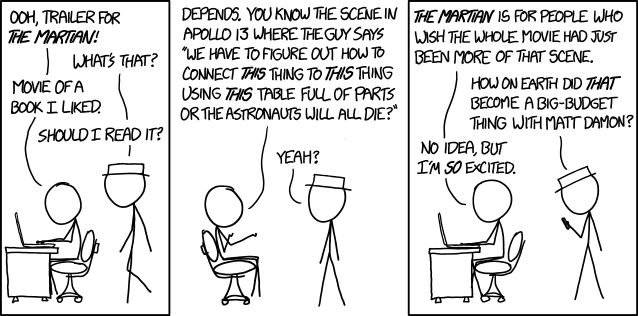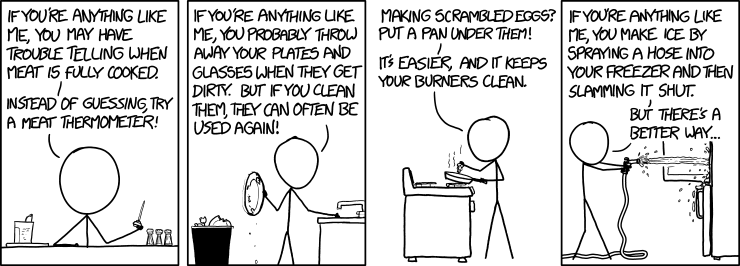No spoilers
The other day I really wanted something to do that would give my eyes a break from focusing on things right in front of them. So I looked for audiobooks, and remembered that I’d been planning to read The Martian – mostly because of this comic and its hover-text:
Particularly interesting because that’s XKCD, by Randall Munroe, who used to work at NASA.
Anyway, it’s great. Can’t think of another book that has hooked me so utterly in one, brief opening chapter. Not through any unconventional literary trick, it’s just a quick summary of the narrator’s predicament: stuck on Mars, presumed dead, probably will be.
The Martian does three things I really, really like:
-
Get to the fucking point: I don’t need to know what Mark Watney looks like, I don’t need a scene-setting prologue of what his daily life was like before this, I don’t need to be shown how much he loves his wife and kids in order to see him as human. If this book is about an interesting situation, get to the interesting situation. The Martian starts there.
-
Explain the mechanics: if this is a problem, why is it a problem? If the obvious solution won’t work, why won’t it work? If Watney thinks X is the best plan, why is it the best? What’s wrong with Y? Could X go wrong? What’s his plan if it does? The Martian goes into rigorous detail on all of this – figures, equations, scientific principles – probably too much for some people, but it’s catnip for me.
One of the reasons I love games more than other media is that the best ones have consistent rules, so extraordinary feats or miraculous triumphs actually mean something. Watney’s solutions to his endless problems feel clever because the problems are presented within a set of rules we understand, and the solution is one we didn’t see. I have no idea if they’re realistic, but all I need is that they’re understandable and internally consistent.
-
Have a likeable character: The Martian’s not really about character – Watney is just smart and resourceful to ridiculous extremes, and the book is more interested in what he can do with that than in examining his flaws and complexities as a person. But Watney’s also the narrator, so it matters a lot that you like him. His tone is most of what sold me in that opening chapter: he describes his uniquely dire situation in brief, clear and relatable terms, then jokes about how dead he is. That’s more or less the tone throughout – occasionally he finds it a little harder to joke about, but not for long.
In another predicament, this chipperness might undermine the stakes, but being stranded on Mars sort of takes care of that by itself. The utter isolation, the impossible distance, the brutal hostility of the planet, all come with a strong emotional payload. Whenever there was a twist in his fate, I found it surprisingly affecting just because of the dizzying magnitude of the problems involved. Jesus, imagine being that far from earth and losing your only source of X. I don’t need Watney to mope about it to feel the scale of the problem. The facts alone send a shiver down my spine.
The book does have a few problems:
- A few times, Watney says something sexist or homophobic, usually in his jokey messages back home. Yes, it’s the character and not necessarily the author, but they’re usually in the context of jokes and there isn’t really any reason the author would want to put you off Watney, as above. It sticks out because he’s otherwise very decent – it reads more like adopted bad language that’s gone unquestioned. If he’d been stuck on Mars since 1950, it’d make a lot of sense.
- The book doesn’t stick with Watney on Mars, and it’s a lot weaker when it cuts back to Earth. Sometimes it’s interesting to know the mechanics of what NASA is trying, but the characters there are mostly flimsy stereotypes.
The audiobook also has a lot of audiobook-specific problems – I’d advise going with the text version if you have the choice:
- Narrator R C Bray has a good Watney voice, and a good narrator voice, but he also does accents for all the other characters, and a truly toe-curling ‘woman voice’ for all the female characters. It operates on the bizarre notion that all women sound breathy and meek, including a) the commander of the most expensive and advanced space expedition in history, b) a foul-mouthed bulldog of a press officer, and c) a primetime news show host.
- Many sections of the book involve long series of characters and numbers that the eye would skim over on the page, and these are hilariously unsuited to being read aloud. This edition makes absolutely no concession to these – at one point he’s just reading out letters, symbols and numbers for about 5 minutes straight. It’s close to parody.
- He mispronounces ‘sysop’ every time, even when it’s being said by the sysop, and this is agony without equal.
Apparently it’s £3 on Kindle? On the one hand, wow, I really profoundly got the wrong edition here, but on the other, it’s two days later and I’ve listened to the whole thing, because I could do it while I cook, cycle, exercise, shower or anything else. Audiobooks are great. People should definitely stop reading them like idiots.


















 If you've got a Moto G or Moto E, your phone has an FM radio built right into the design. Motorola's official app for using the FM tuner isn't much to write home about, but it's become considerably better today. The updated app (version 02.00.0045, according to the Play Store) updates the player's user interface to a fresh Material Design theme, now with a fetching teal and white color scheme.
If you've got a Moto G or Moto E, your phone has an FM radio built right into the design. Motorola's official app for using the FM tuner isn't much to write home about, but it's become considerably better today. The updated app (version 02.00.0045, according to the Play Store) updates the player's user interface to a fresh Material Design theme, now with a fetching teal and white color scheme. 






